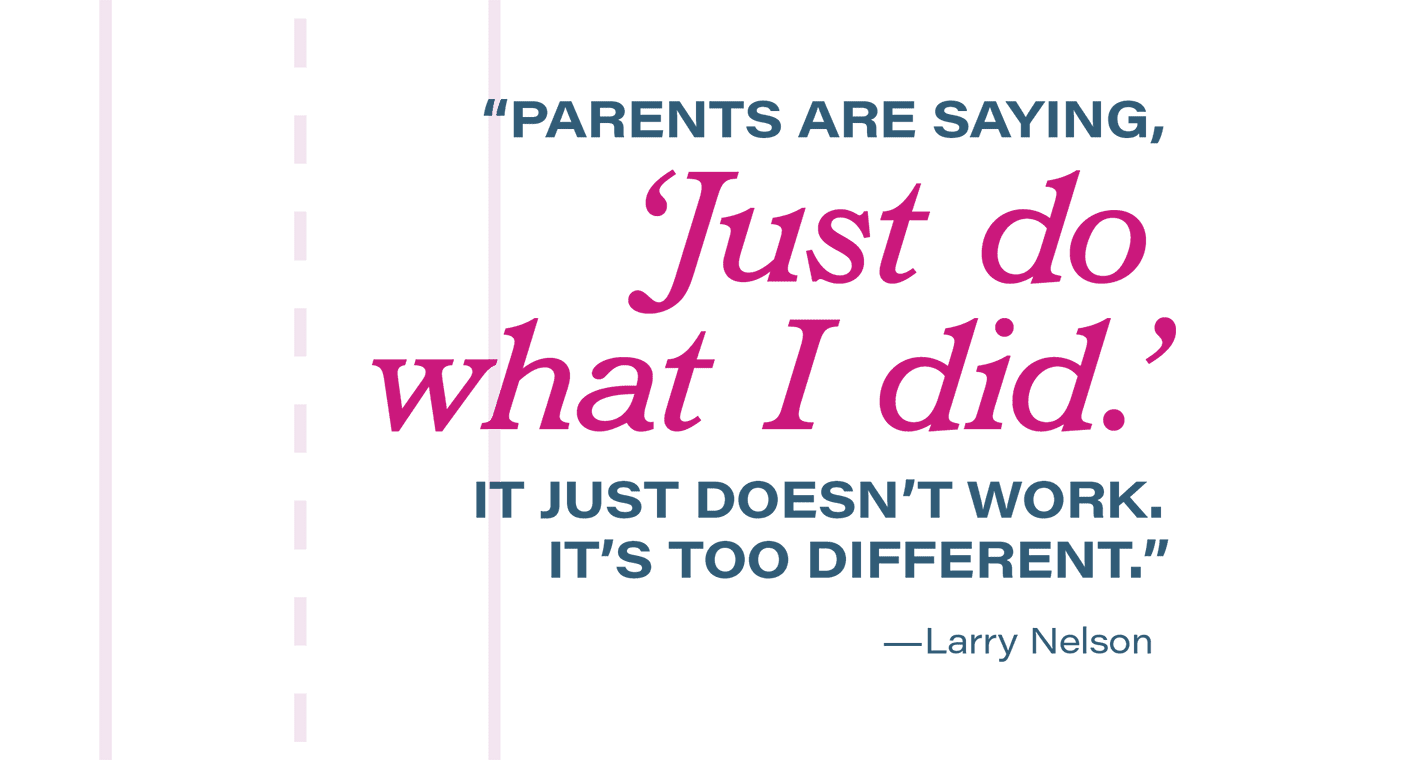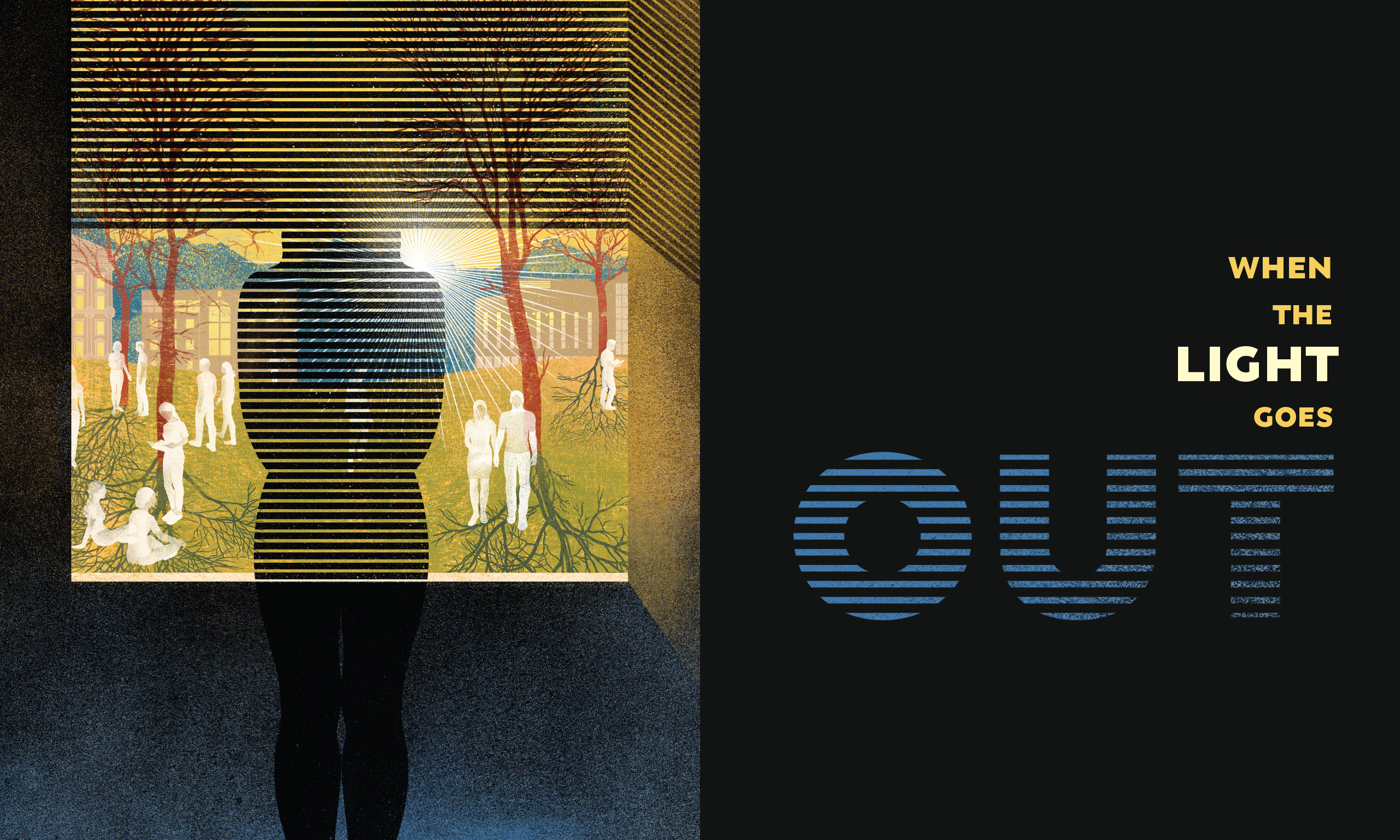Stuck in Neutral on the Road to Adulthood

The road to adulthood—whatever that means—has never been longer. Should we be worried?
By Melody McGrath Warnick (BA ’99) in the Fall 2019 Issue
Photography by Bradley H. Slade (BFA ’94)
Taylor C. Morris (BS ’17, MAcc ’17) may be 27 years old, but he can tick off all the reasons he doesn’t think he qualifies as an adult yet.
First, adults have careers. Morris may work as a financial consultant, but to him it’s “just a job.” Adults, to his way of thinking, are married with kids. He’s single. Adults put down roots and own homes. He shares a house with roommates in Palo Alto, California, but he hopes to relocate to Europe or Southeast Asia in a year to get some adventuring out of his system before he settles down. “I want to have that period of exploration,” Morris says.
Like the whopping 85 percent of the 18- to 27-year-olds asked in one study, “Do you consider yourself an adult?” Morris says no, at least not all the time. Occasionally he has an adult-y moment, like when he’s watering the lawn at his rental house. (Adults water the lawn!) Mostly, though, he thinks of himself as barely occupying the same territory as the parents, Scout leaders, and teachers he admired as a teenager in Boise, Idaho. “I don’t feel like them at all really,” he says. “Everything’s still kind of up in the air.”
Here’s a secret: Even 40-somethings don’t always feel like adults. But BYU researchers say a few things have changed dramatically in the last 25 years about how young people transition to adulthood, starting with how globally pervasive Morris’s Peter Pan feelings have become. Today’s young adults are hitting traditional adult milestones (landing full-time jobs, marrying, having kids) later than any of their predecessors have. They’re more likely to treat their 20s as a playground because, hey, you only live once. With no clear definition of what adulthood is, let alone a sense of it as being something desirable to achieve, “it’s no longer a short transition to adulthood,” says Larry J. Nelson (BS ’94, MS ’96), a professor in BYU’s School of Family Life. In fact, the transition has become such a prolonged, wobbly journey that researchers now consider 18–29 an entirely new stage of life, called “emerging adulthood.”

Nelson who is a coeditor with his BYU colleague Laura Padilla-Walker of an Oxford University Press book called Flourishing in Emerging Adulthood: Positive Development During the Third Decade of Life, has spent 19 years studying the phenomenon of emerging adulthood. And frankly, the trends have him concerned. Young adults have always been prone to (mis)adventures. The frontal lobe of the brain, responsible for impulse control, perspective taking, and long-term planning, typically doesn’t finish developing until age 25, so biology hamstrings young adults from making mature decisions. If that’s always been the case, then what has changed? “It’s the context,” says Nelson—the real fear factor now is the world in which emerging adults are trying to make this already-difficult leap.
For centuries, Nelson explains, 18- to 20-year-olds were quickly slotted into apprenticeships, careers, the military, and marriage. After teens left the safety of home, these social structures acted like foxholes in that they largely protected young adults from dangerous influences and their own worst impulses. With the distance between home and these foxholes widening, young adults are lingering longer than ever in the danger zone—a period marked today by drug and alcohol abuse, sexual activity, pornography use, video-game addiction, illegal activity, faith crises, and the onset of anxiety, depression, and other forms of mental illness.
Without spouses or responsibilities, mortgage payments to make or toddlers to chase, says Nelson, “now [young people] have the freedom to decide what to do with their time, what behaviors to engage in, and they don’t have the [brain development] or any structure to help them in this process.”
If you’re one of these young adults navigating no-man’s land, should you be concerned? What steps can you take to mitigate risks and not get stuck in a developmental rut?
Or if you’re a parent, how do you guide a child who has fledged the nest but could be poised for a crash landing? Who has nominally grown up but doesn’t always act like a traditional adult? Who may not even want to? Nelson sees the anxiety when he speaks with parents of emerging adults. “Parents are scared to death of this time period,” he says. “They don’t know what to do.”
BYU experts have advice for emerging adults and their loved ones. Nelson’s first suggestion is for the parents: Forget everything you think you know about what it’s like to be this age, based on how it was for you. “Parents are saying, ‘Just do what I did,’” Nelson says. “And it just doesn’t work. It’s too different.”
What Makes Someone an Adult?
How you answer that may say something about your age. Traditionally, adulthood has been defined by age (typically 18+) and events: leaving home, entering college or the military, getting married, having children, starting a career. But Nelson’s research found that Latter-day Saint emerging adults, like their peers, define adulthood more in terms of actions and abilities: their top three criteria were accepting responsibility for the consequences of their actions, deciding independently on personal beliefs and values, and becoming less self-oriented. Much farther down the list were events like completing a mission, finding full-time employment, getting married, and having a child.
The Longer, Harder Road to Adulthood
Last May in a BYU Conference Center classroom, Nelson flashed a PowerPoint slide onto a screen for the 60 or so mostly middle-aged parents gathered to hear his continuing-education lecture on “Flourishing and Floundering in the Transition to Adulthood.” The slide featured a familiar meme, a picture of a girl sprinting like she’s being chased by wolves. Superimposed are the words, “Adulthood! Run Away!”
One reason they’re running is how long it now takes to achieve financial independence. Still in the shadow of the Great Recession, students are leaving college with fewer high-paying-job prospects and more than $35,000 on average in student-loan debt. They don’t feel economically stable enough to move out of Mom and Dad’s basement, let alone get married. As a result, “they’re not taking on those adult responsibilities and adult roles of marriage until much later,” says Nelson. How much later? In the 1950s American men got married at age 22, on average, while women married at age 20. By 2018 the average age for a first marriage in the United States had risen to 30 for men, 27 for women.

Does it matter? Couldn’t it be a good thing to allow young men and women more time to mature, get through school, and launch careers before adding the pressure of marriage?
Possibly, if it were just about progress and preparation, says Nelson. But he frets about the opportunity cost: he sees many emerging adults replacing traditional milestones with a whole lot of self-centeredness and risk-taking or time-wasting behavior. “Ask young people what they should be doing [in their 20s], and they’ll tell you this is the time period to party, to explore relationships, to travel, and to enjoy being lazy. They see this time period as being about anything but becoming an adult.”
Problematic behaviors are particularly common among young men. Padilla-Walker, a professor in the School of Family Life, says that may be traceable to a “boys will be boys” attitude in their upbringing that “gives boys an excuse to behave badly instead of teaching them what they are capable of through hard work and persistence.” Under this “guy code,” which can get stronger in college, young men who lack support to manage and express emotions end up indulging in problem behaviors.
Nelson sees anecdotal evidence of this at the end of every semester, when students who are about to fail one of his classes try to salvage their grade. “What happened?” Nelson will ask. Too often, the answer involves video games. Many young men who come to see him spend the entire weekend—“until the wee hours of Monday morning”—playing video games. Nelson says these young men “don’t date. Many don’t go to church. They just binge.”
And Nelson’s seen hints of a worrisome shift in attitudes toward the foxhole of marriage itself at BYU. While not everyone’s delaying, and there are many who would get married if the opportunity presented itself, he says many students see marriage as anything but a priority. Recently, one of his female students shared that the men in her BYU family home evening group, all returned missionaries, declared they couldn’t think of one good reason they would be better off married than single, besides sex. (Cue his next slide, which says, “I’ve been single for a while, and I have to say it’s going very well. Like . . . it’s working out. I think I’m the one.”)
For Latter-day Saints part of the problem is that emerging adults may have skewed expectations that marriage should bestow constant bliss. But when their relationships end up adding stress to their already stressful lives, they become gun-shy.
BYU students say they also hear mixed messages about marriage; often even their parents are urging them to wait. Brian J. Willoughby (BS ’04), an associate professor in the School of Family Life who studies marital decisions, likes to ask his students, “How many of you have had your parents [pressure] you in some way to not get married?” About half of the class—mostly women—will raise their hands.
Women today are encouraged like never before to pursue higher education and careers. For many Latter-day Saint women, marriage can be seen as an end to those ambitions because of pressure to have children quickly. “There’s a sense that ‘Once I get married, the window to get done with school and start a career is super tight. I need to get as far along in that trajectory as I can before I get married,’” Willoughby says.
5 Characteristics of Emerging Adulthood
Identity Exploration: Emerging adults are figuring out who they are, especially around work, love, and worldviews.Instability: Emerging adults are bouncing among life changes in relationships, work, education, and location.A Feeling of Being In-Between: Emerging adults don’t feel like teenagers or adults.Self-Interest: Emerging adults aren’t necessarily self-centered, but they’re free of major responsibilities for others.A Sense of Possibility: Emerging adults believe they have a multitude of options for the future, and they can be both optimistic about and overwhelmed by their choices.
Flourishing vs. Floundering
Does attending BYU or being a Latter-day Saint offer any protection to emerging adults? Nelson and his colleagues note that societal trends typically hit campus a few years after they hit the general population, and usually less intensely. Even so, says Nelson, “We know that young Latter-day Saints are indeed delaying. We know that they are having faith crises. We know that they are battling some of the same factors that lead to floundering, like high video-game use. Their religion may protect many of them from the extreme dangers of emerging adulthood, but they are not immune to the potential pitfalls of this time period.”
The good news is that research also shows that, in general, Latter-day Saints are transitioning to adulthood faster and more successfully than non-Latter-day Saints, marrying four to five years earlier on average. “They have an emerging adulthood; it just tends to be shorter because of the earlier transition to marriage and parenthood than other emerging adults in the U.S.,” says Carolyn McNamara Barry, a Catholic professor of psychology at Loyola University Maryland who studies emerging adulthood among religious communities. “[The Church of Jesus Christ of Latter-day Saints] provides a clear structure to support young people in realizing adult responsibilities.” In other words, behaviors like holding a calling, ministering to others, serving a mission, and performing daily acts of devotion are their own kind of protective foxhole.

Flourishing young adults seek out foxholes, says Nelson. “If they will take advantage of the structure being offered via family, faith, and focus, then I have real hope for them.”
What else do flourishing emerging adults do differently? Nelson and other experts, including some parents and emerging adults themselves, offered these seven ideas for a successful transition to adulthood:
Flourishers explore courageously.
The major task for young adults is figuring out who they are and what they want to be when they grow up, a process called identity formation. “You’re trying on different things, exploring different things, and then you start to make commitments, to say, ‘This is who I am,’” says Sam A. Hardy (BS ’99), a BYU associate professor of psychology.
How parents can help: They encourage positive exploration. Nelson says that taking an extra semester for a study-abroad program or joining an after-work rock-climbing group may help young people form a stronger, more purposeful sense of themselves.
Flourishers sidestep perfectionism.
Emerging adults can get trapped on the hamster wheel of “ruminative exploration,” obsessing over majors and marriage partners without ever committing because they’re afraid of making a wrong choice. Flourishing young adults don’t expect perfection of themselves.
How parents can help: The mother of three emerging-adult BYU students, Erin L. Willder (BA ’94) likes to remind her children, “Life is a process of becoming.” She’s also clear about putting the word mistakes in air quotes, “because in the grand scheme of things, some of the worst mistakes are the springboard that move you forward.”
Flourishers are pro-social.
Unlike flounderers, who prioritize pleasure for its own sake, flourishing young adults spend free time with—and for—others. Instead of pursuing solitary or harmful activities like excessive video gaming or abusing substances, they seek out purposeful pro-social activities like dating, actively participating in their church congregation, or volunteering.
How parents can help: They can encourage a balanced approach. “Some parents are like, ‘Yeah, my kid’s always out there socializing, but they’re not attending class and they don’t hold a calling in the ward,’” Nelson points out. Parents can talk with their children about how to set limits and make a schedule that encompasses both social and purposeful solitary time.

Flourishers take ownership of their faith.
Emerging adulthood has become known as a time of faith crises, but studies also show that religious emerging adults have higher levels of well-being, gratitude, purpose, self-esteem, and self-control; they’re less likely to binge drink or be sexually promiscuous; and they’re less likely to suffer depression and anxiety. Flourishers work to internalize and live their beliefs, and they ask questions when they have them.
How parents can help: They talk openly about their own faith journey, answer questions authentically, and encourage their children wherever they happen to be spiritually—no nagging. They also foster spiritual autonomy by acknowledging their children’s right to make their own choices. “The Lord has had to teach me the areas I am no longer entitled to inspiration about because they are no longer my direct stewardship,” says Laura M. Biggs (BA ’88). “I’m privy to many of my children’s challenges, but I’m not entitled to the solutions to those challenges that come from the Lord. Only they are.”
Flourishers prepare realistically for marriage.
While marriage can provide structure and protection for emerging adults, Nelson says, “I don’t equate marriage with flourishing per se, because I think that a lot of young people, especially in our culture, run into marriage woefully unprepared for it.” The flourishers maintain reasonable expectations—for instance, by internalizing one of the mottos that Willoughby shows his marriage class: “Just because you love someone forever doesn’t mean you’re going to like them every day.”
How parents can help: They can ban the question “When are you going to get married?” from their vocabulary. It’s not helpful. What is? Talking realistically about the joys and effort of building a successful marriage.
Flourishers talk to their parents.
A multitude of research shows that emerging adults who have warm, supportive relationships with their parents are more likely to flourish—and more likely to want to maintain a close relationship through emerging adulthood. “They just want the nature of the relationship to mature,” says Nelson, whether that looks like daily texts or occasionally asking for advice (and flourishers do ask).
How parents can help: They trust and support their children without helicoptering. When Crystal Kent Willis’s (BA ’95) daughter Hannah got engaged, friends asked if she liked her fiancé. Yes, she replied. “But on reflection, I’ve come to the idea that the right answer is, ‘Does it matter?’ That is her choice. I cannot make her choice. I don’t know what’s right or wrong for her. So my choice is to be the supportive mother and mother-in-law who hopes for and believes the best. He’s part of the family now, and we’re in. Whatever it brings, we’re in.”
Flourishers accept uncertainty.
“Almost everyone my age seems to struggle with some uncertainty about their place in the world, whether life is going well or they’re making the right decisions,” says Soren J. Schmidt (BA ’17), 26, currently a student at Yale Law School. When carefully laid plans go awry, it’s natural for young adults to feel unsettled. Flourishers focus on seeing change as a new path to explore, not a derailment.
How parents can help: They can provide perspective, perhaps by sharing how their own experiences didn’t always lead to the happy endings they expected—but did lead to growth and unplanned joy.
How to Become an Adult
One of the last slides in Larry Nelson’s PowerPoint had a picture of the Savior with the words Focus on the one. For parents and for emerging adults, there’s no single right way forward. Not all will marry. Not everyone will graduate from college. But anyone between 18 and 29 (and beyond) can create a good life.
As a father, a teacher of emerging adults, and a researcher, Nelson can’t help but worry. Autonomy, underdeveloped brains, and a focus on risk taking and pleasure seeking can all combine to catch emerging adults too long in the danger zone outside the foxhole. But miraculously, he says, many young people are still thriving anyway. “For those who are doing well in such a difficult time, it speaks to the quality of those young people,” Nelson says.
Feedback: Send comments on this article to magazine@byu.edu.




